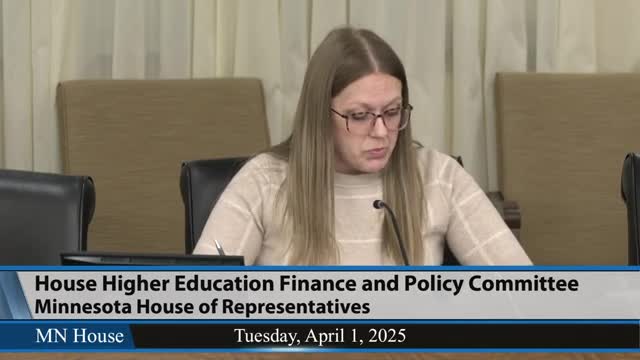Metro State seeks approval for applied doctorate in cybersecurity
April 02, 2025 | 2025 Legislature MN, Minnesota
Thanks to Scribe from Workplace AI , all articles about Minnesota are free for you to enjoy throughout 2025!

This article was created by AI using a video recording of the meeting. It summarizes the key points discussed, but for full details and context, please refer to the video of the full meeting. Link to Full Meeting
Chair Robins opened the session by highlighting the importance of defining the missions of public higher education in Minnesota to avoid overlap. He noted that Minnesota State had previously been granted authority to offer applied doctorates in various fields, and this legislation aims to expand that list to include cybersecurity. He emphasized the growing relevance of artificial intelligence (AI) in future educational planning, indicating that a related bill addressing AI would be discussed later in the week.
President Arthur then provided an overview of Metro State's established cybersecurity programs, which have received national recognition from the National Security Agency (NSA) and the Office of the Director of National Intelligence. She detailed the university's successful initiatives, including the Cyber for Heroes program, which assists veterans and first responders in obtaining cybersecurity certifications, and a cybersecurity clinic that helps local entities enhance their cyber defenses.
Arthur pointed out the pressing workforce need in cybersecurity, citing a national shortage of 460,000 unfilled positions, with approximately 5,700 vacancies in Minnesota alone. She underscored the projected 33% growth rate for cybersecurity jobs over the next decade, highlighting the potential for graduates to achieve middle-class status through these well-paying roles.
The discussion also touched on the critical shortage of doctorally qualified faculty in the field, which hampers the development of a skilled workforce at various educational levels. Arthur argued that the proposed applied doctorate would not only enhance Metro State's offerings but also support the broader educational ecosystem in Minnesota by strengthening partnerships with two-year institutions.
The committee concluded the session by inviting public testimony and member discussion, with Representative Knorr expressing interest in the proposal. The meeting underscored the urgency of addressing cybersecurity education and workforce development in Minnesota, setting the stage for further legislative action on this critical issue.
Converted from House Higher Education Finance and Policy Committee 4/1/25 meeting on April 02, 2025
Link to Full Meeting
Comments
View full meeting
This article is based on a recent meeting—watch the full video and explore the complete transcript for deeper insights into the discussion.
View full meeting


